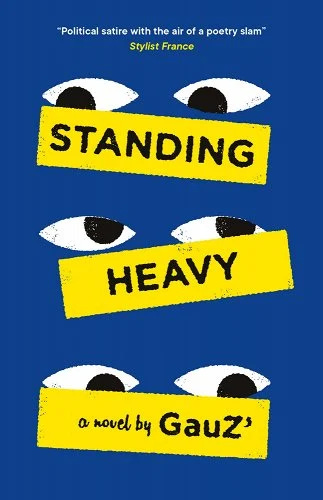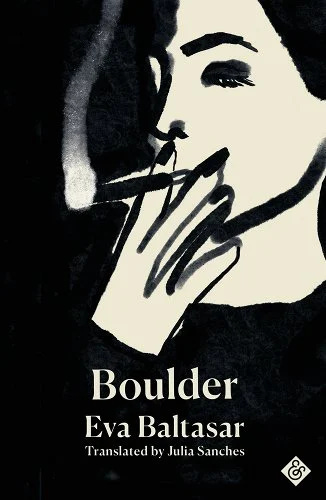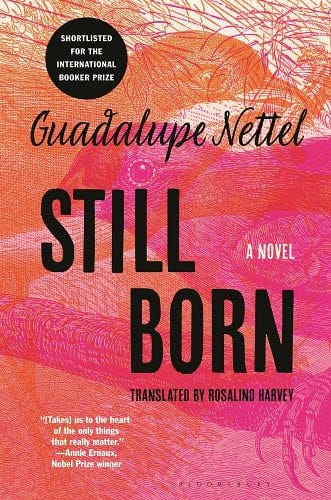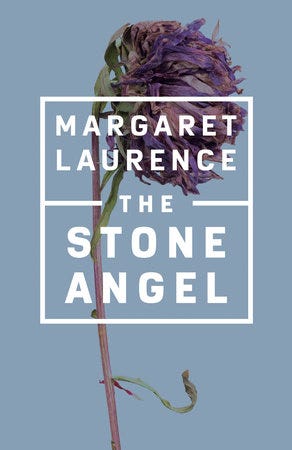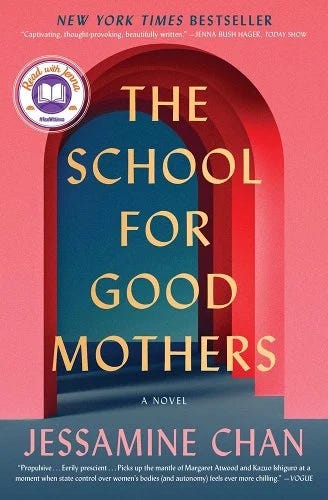Recent Reading: GauZ', Baltasar, Gornick, Nettel, and more
I haven’t managed to write about all of my reading from this past spring, but below are some highlights. I’ve excluded Kate Briggs’s marvelous novel The Long Form because I hope to write something longer about it, but in the meantime it’s wonderful, and if your reading taste is at all like mine, you’ll want to preorder it. It comes out in the U.S. in October. Trust me on this one.
Standing Heavy by GauZ’, translated by Frank Wynne (Biblioasis, 2023; originally published in 2014)
I read the UK edition of Standing Heavy after it was longlisted for the International Booker because it’s not coming out in the U.S. until this October. I liked it but am not sure it should have made it to the shortlist. It felt a little slight, maybe? It’s set in Paris and follows three security guards from Côte d’Ivoire as they do their best to create lives for themselves and as the vicissitudes of world events change the circumstances of their jobs and living conditions. Interspersed among these stories are vignettes set in the shops where the guards work, letting us see the world and in particular the customers through their eyes. These vignettes are fun and reminded me of Kate Zambreno’s novel Green Girl, which also captures the boredom and unreality of hours spent working in shops, this time from the perspective of a young saleswoman in London. These books are different in tone — Standing Heavy is funnier and more sharply satirical — but they both get at what it’s like to stand all day surrounded by merchandise and at the whims of customers and bosses.
There’s a lot going on this in this book — immigrant experiences of Paris covering 50+ years, the intertwined lives of the main characters and their families, consumerism and shop culture, racial stereotypes, the day-to-day work of being a security guard (“standing heavy” refers to having a job that requires standing for a living). It deals with a lot in a quick 165 pages, and perhaps that’s an argument for why it should be on the shortlist. It has a light, glancing tone and moves quickly, relying on just a few telling details to fill in a larger picture. Perhaps I’m doubting the decision to shortlist this book because I’m biased in favor of length and depth as opposed to the kind of evocative quick sketch that may feel slight but isn’t. Perhaps I’m wrong!
Boulder by Eva Baltasar, translated by Julia Sanches (And Other Stories, 2022)
Boulder was also part of my International Booker reading; like Standing Heavy, it was shortlisted (and, like Standing Heavy, did not win — Time Shelter did), although I thought it was a better book and solidly earned its spot on the shortlist. It’s another very short book at 105 pages and is a queer perspective on motherhood and deciding whether to be a mother. The protagonist, who gets nicknamed “Boulder,” is a great character: she’s fiercely independent and loves her wandering life as a cook on a merchant ship. She wants a physically-demanding job and thrives on the work. Then she meets and falls in love with a woman named Samsa, and the two of them move to Iceland. And then Samsa, who is 40, decides she wants to have a child. Boulder doesn’t understand this, but goes along with it because she loves Samsa that much. The rest of the book plays out the consequences of these decisions.
The portrait of motherhood and ambivalence about motherhood is great, but what really stands out is the quality of the writing, which is strange, sharp, and poetic in a jolting, sometimes disorienting way. The sentences are assured, confident, vibrant. Here’s a description of how Samsa gives Boulder her nickname:
She says I’m like those large, solitary rocks in southern Patagonia, pieces of world left over after creation, isolated and exposed to every element. No one knows where they came from. Not even they understand how they’re still standing and why they never break down…Samsa lets her hair down and tickles my forehead, my eyelashes, my neck. She calls me Boulder and I don’t know why we laugh. Maybe love is unfurling above us like an enormous branch that bends and touches all the most sensitive, reticent parts of us.
This description of Boulder works for the book as well — it, also, feels like a solitary, exposed rock of mysterious origin, beautiful and strong.
Taking a Long Look: Essays on Culture, Literature, and Feminism in Our Time by Vivian Gornick (Verso, 2022)
Vivian Gornick is a favorite. Somehow she writes so plainly and directly and is so brilliant and profound all at once. What a mind! Taking a Long Look is a collection of book reviews and essays written over 40 years and arranged in reverse chronological order. I’m not sure why they decided on this order, and I frequently wished for details about when and where the pieces were published. Why not give a little context? Otherwise, I loved the collection. There’s no one like Gornick to see into the heart of a book and lay it all out for the reader. Her personal essays have a brisk, no-nonsense quality I love. Like Mary McCarthy, I think, she tells the truth no matter how it makes her look, or how it makes you feel.
I found it interesting to read a series of reviews that follow a similar format — presumably written for the same venue — beginning with some cultural or literary/historical context, then, after a section break, diving into the author’s biography, and then moving to a description of the book under review, and then getting to interpretative and evaluative claims. It’s formulaic, but Gornick works the formula very, very well. Who else could say so much in ten pages?
Still Born by Guadalupe Nettel, translated by Rosalind Harvey (Bloomsbury, 2023)
I read the UK edition of Still Born out from Fitzcarraldo Editions; the U.S. edition comes out in August. This is another book shortlisted for the International Booker Prize. I loved it. It was an unusually immersive experience for me; I found myself sinking into the language and ideas and not wanting to leave its world. It’s the second novel about motherhood on the International Booker list, which is a pleasure in and of itself. It’s a very different novel from Boulder, the other motherhood novel on the list, or perhaps I should say these are books about deciding whether to become a mother or not. Laura, the narrator of Still Born, decides motherhood is not for her, but her good friend Alina makes the opposite decision. Alina’s life takes an unexpected turn when she learns her baby may not survive birth. Laura’s life takes its own unexpected turns as she cares for Alina and also for the troubled boy who lives next door. She’s not a mother, but she does mother, in a sense. The book is about a whole range of mothers and ways to mother, and I loved how it set out to explore an idea — to broaden the idea of what it means to be a mother — and did so with a story and narrative voice that kept me such good company.
The Stone Angel by Margaret Laurence (Penguin Modern Classics, 2017; originally published in 1964)
This was the book for April’s episode of One Bright Book, so you can find out what Frances, Dorian, and I thought about it there, but, briefly, I loved it, even though (or because?) it was heart-wrenching. Books regularly make me cry these days, I guess. The protagonist Hagar is kind of a terrible person — a judgmental, ornery, elderly woman who sometimes says mean things on purpose and sometimes they slip out before she knows it. I’ll admit I identified with her just a little bit. She’s mean and difficult, but she actually wants to connect with other people, if only she could let herself. As she nears the end of her life, she comes to understand why she is the way she is, at least one some level, perhaps not as deeply as the reader sees it, but there’s some recognition there. It’s masterful the way Laurence makes us sympathize with the people in Hagar’s life, because living with her is really not easy, but also makes us understand and sympathize with Hagar as well. I had so many feelings about this book.
The School for Good Mothers by Jessamine Chan (Simon and Schuster, 2023)
This book was too long. Or, since I listened on audio, maybe the audiobook narrator read too slowly and I made a mistake by waiting too long to increase the speed. If I had been reading this in print, I might have skipped to the end to find out what happened and then put the book down. It’s a truly chilling story: Frida makes the mistake of leaving her baby home alone for a couple hours, gets reported by a neighbor, and has her baby taken away. Then in order to get her back, she has to attend a school where other “bad” mothers are retrained. The school is a nightmarish place, and the “training” amounts to one long, cruel lesson in how no mother can ever be good enough. It’s a good concept for a novel — an absolutely horrific one — but the book gets bogged down in describing the ins and outs of the school and makes you wait too long to get to the resolution (which I didn’t particularly like).
That’s it for now — I hope your June has started off well, and thank you as always for reading!




